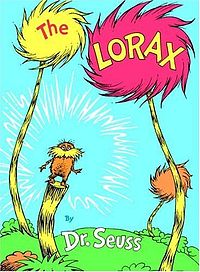2/5
What still strikes me now, fourty-two years after it was written, was how fair "The Lorax" was. It was a cautionary fable about the price of a cushier life for man. It had a strong, serious message explained in Theodore Geissel's clear and gentle brilliance. It has been challenged in the past by people who felt it was unfair to the foresting industry, but it wasn't merely a one-sided rant. Especially in the 1972 animated short, the profit-driven Once-ler shows remorse for the damage his empire causes, and The Lorax seemed willing to compromise. There is a cost to civilization, and to personal gain. But he also allowed the faceless Once-ler his human weakness, instead of painting him as a simplistic villain.
Geissel knew that it's easy to do wrong by our world. But it's also easier than we admit to do the right thing.
Which is why I understand the damage the 2012 adaptation does to the material. I'm sure Illumination Entertainment meant well when they shilled for gas-guzzlers and disposable diapers. That doesn't make this a bad movie. It means their marketing division is run by the Grinch.
▼
A young boy in a plastic civilization wants to impress a neighborhood girl. She wants nothing more than to see a real, honest-to-goodness tree(one that doesn't require AA batteries). How she knows what a tree is or even looks like, in a city run by a dwarf who polices any knowledge of organic life is a mystery. "Ted" (Zac Efron) will do anything to find a real tree, even if it means making an enemy of Thneedville's greedy mayor, and heading into the abandoned outskirts where the Once-ler lives.
The Once-ler (Ed Helms) tells his story to the boy, in parts, and it is here where the schizophrenic nature of the film is brought into full attention. There is the A story, of the boy's search for a tree, and the B story, which is the story of The Lorax told in flashbacks. Two movies are at odds with each other, fighting for the same screen. It bounces back and forth between being the story people expected from it, and being a condescending cash-grab. There must have been infighting, between those who understood Geissel's message, and meddling suits who wanted to shackle it to a proven formula. This is a movie playing tug-a-war with itself and its' audience.
To be fair, I enjoyed some newer elements pasted onto the nostalgic resources. I could feel the writer's amusement at their own sarcasm for the reliance of modern life. In Thneedville, the citizens happily buy air as long as it's in a plastic bottle. There is a colourful inventiveness to the visuals, which sometimes beautifully renders the Dr. Seuss art style into the third dimension. But every single human face looks... off. The eyes are too small, too packed together and the mouths hang low on their chins. It's like looking at those photoshopped pictures of people with their faces shrunken down into their heads. And I'd had enough of obnoxiously "cute" happy meal toys being shoved front and centre well before the movie tired of it.
In spite of a hellish music number that speeds through most of the rise and fall of the Once-ler brand, The Lorax is(unsurprisingly) at its' best when it's about... The Lorax. Imagine that. The emotional payoff came for me long before the Big Chase Scene and Musical Number ending. And I feel the blame is unfairly taken from the Once-ler's actions, and dumped onto his 1-dimensional family. But amidst all of its' pandering and prostitution, the film quietly sneaks in a reunion fourty years in the making.
It was a stroke of genius to allow Danny DeVito to speak for the trees. The rest is simply a stroke.



No comments:
Post a Comment